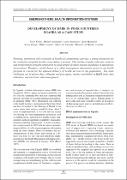| dc.contributor.author | Kintu, Peter | |
| dc.contributor.author | Nanyunja, Miriam | |
| dc.contributor.author | Nzabanita, Amos | |
| dc.contributor.author | Magoola, Ruth | |
| dc.date.accessioned | 2019-11-08T12:57:51Z | |
| dc.date.available | 2019-11-08T12:57:51Z | |
| dc.date.issued | 2005-04 | |
| dc.identifier.citation | Kintu, P. et al., 2005. Development of HMIS in poor countries: Uganda as a case study. Health Policy and Development, 3(1), pp. 46-53. | en_US |
| dc.identifier.uri | http://hdl.handle.net/20.500.12280/2543 | |
| dc.description.abstract | Planning, monitoring and evaluation of healthcare programmes provides a strong foundation for the realisation of quality health service delivery systems. This involves regular collection, analysis and interpretation of health information to guide proper decision-making and design of appropriate interventions. Therefore, establishment of a robust management information system in any health program is crucial for the efficient delivery of health services to the population. The main challenges are in-patient data collection and processing, regular availability of HMIS tools, data utilisation, and electronic data management | en_US |
| dc.language.iso | en | en_US |
| dc.publisher | Uganda Martyrs University Press | en_US |
| dc.relation.ispartofseries | Health Policy and Development;volume 3 number 1 | |
| dc.subject | Development of HMIS | en_US |
| dc.subject | Poor countries | en_US |
| dc.subject | Low developed countries | en_US |
| dc.subject | Developing countries | en_US |
| dc.title | Development of HMIS in poor countries: Uganda as a case study | en_US |
| dc.type | Article | en_US |


